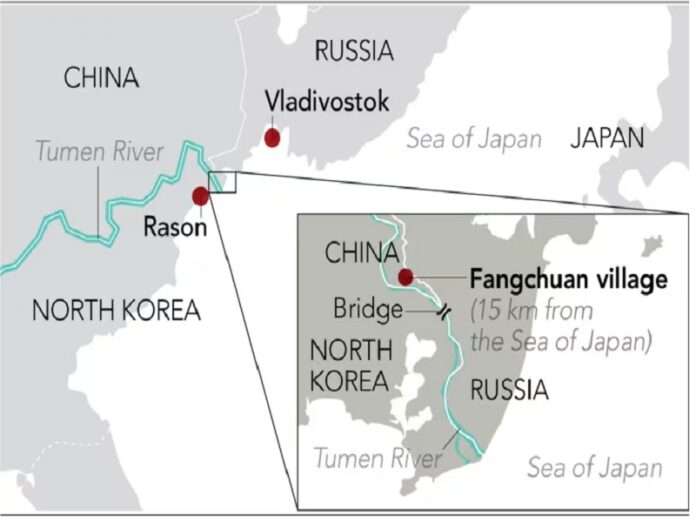There’s been lots of media hype this month about the possibility of Russia and North Korea allowing China to use the Tumen River to bridge the 15-kilometer gap for accessing the Sea of Japan from its landlocked northeastern province of Jilin. Japan’s Nikkei reported on 14 June that “China eyes Sea of Japan access via Russia-North Korea border river”, which was followed by Newsweek publishing a piece on 20 June titled “Map Shows Russia Border River Eyed by China”.
Both articles cite last month’s Sino-Russo joint statement which included a clause about “conduct[ing] constructive dialogue with the Democratic People’s Republic of Korea on the matter of Chinese vessels navigating to the sea via the lower reaches of the Tumen River.” Nikkei suggested that China would use this route to deploy its Coast Guard to the Sea of Japan for diverting Tokyo’s navy from the disputed Diaoyu/Senkaku Islands while Newsweek speculated that Russia might sell this border strip to China.
The first scenario is credible while the second isn’t since Russia’s constitutional amendments from 2020 strictly forbid ceding any of the country’s land. It also doesn’t make sense why Russia would supposedly be interested in cutting itself off from North Korea right after those two just signed a game-changing mutual defense pact whose significance was explained in the preceding hyperlinked analysis. The New York Times agreed one day afterwards here that this agreement does indeed put China in a dilemma.
It essentially serves to shift the focus of the New Cold War from Europe to Asia since it creates the conditions for the US to bolster its military presence in Japan and South Korea on the pretext of responding to Russia’s military support for North Korea. That would put China even more on the strategic defensive than it already is and likely compel it to respond reciprocally should it happen, thus further complicating its ties with the emerging American-Japanese-South Korean axis.
China doesn’t want that to happen though since it’s made a big deal out of its neutrality towards the Ukrainian Conflict and has recently sought to stabilize relations with those two nearby countries through its participation in the first trilateral summit between them in five years last month. Nevertheless, China won’t condemn its partners’ mutual defense pact which risks setting this sequence of events into motion since that would kill its reputation in the Global South, so it’s thus forced to react to developments.
Russia and North Korea want China to openly take their side in the New Cold War, which would revert International Relations back to a system of Sino-US bi-multipolarity, albeit one in which these two could exert more influence over China than the inverse such as if China patched up its problems with the US. The first scenario would see China and the US fiercely compete for global leadership, while the second could see them agreeing to divide it into “spheres of influence” at the possible expense of others.
China prefers peaceful competition over its fiercer manifestations so the second scenario of patching up its problems with the US is the one that it’s aiming for, though that’s not to say that it’s plotting to sell out its partners, just that Russia and North Korea would have less flexibility in that event. Those two would naturally prefer for China and the US to remain increasingly bitter rivals over the future shape of the world order, however, since they expect that China would then fully support them against the US.
How all of this relates to the possibility of China using the Tumen River to access the Sea of Japan is that even the purely commercial use of this waterway without any Coast Guard component could fuel US-encouraged Japanese and South Korean perceptions that Beijing is backing Moscow and Pyongyang. Any tangible progress in reaching an agreement on this after those two’s mutual defense pact would be exploited to speculate that China has begun to openly challenge the West in collusion with them.
All of China’s hard diplomatic work over the last decade to present itself as a responsible stakeholder in Northeast Asia that’s opposed to North Korea’s “nuclear saber-rattling” would be for naught, as would its similarly hard work to present itself as neutral in the Russian-Western dimension of the New Cold War. It might therefore calculate that it’s better to leave the Tumen River proposal on ice than to thaw it at the risk of inadvertently playing into its geopolitical rivals’ weaponized information warfare campaign.
This calculation could change, however, if China’s grand strategic one changes first. In the event that China abandons its balancing act between the West (including this bloc’s Asian allies) and its literal Russian-North Korean enemies, then it would therefore follow that its leadership wouldn’t have any compunctions about whatever the former might think about it using the Tuman River for any purpose. That hasn’t yet happened and might never unfold, so for now, the future of this initiative is uncertain.
